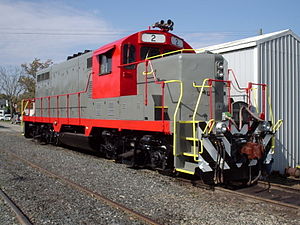GP16

Buckingham Branch Railroad #2, a GP16 rebuild, rests at Dillwyn, Virginia
|
|||||||||||||||||||||||||
|
|||||||||||||||||||||||||
|
|||||||||||||||||||||||||
|
|||||||||||||||||||||||||
|
|||||||||||||||||||||||||
| Type and origin | |
|---|---|
| Power type | Diesel-electric |
| Builder |
General Motors Electro-Motive Division (EMD); rebuilt by the Seaboard Coast Line Railroad |
| Model | GP16 |
| Build date | June 1979 — November 1982 |
| Total produced | 155 |
| Specifications | |
|---|---|
| Configuration: |
|
| • AAR | B-B |
| Gauge | 4 ft 8 1⁄2 in (1,435 mm) |
| Length | 56 ft 0 in (17.07 m) |
| Loco weight | 258,000 lb (117,000 kg) |
| Prime mover | EMD 645 |
| Engine type | 2-stroke diesel |
| Traction motors | 4 DC |
| Transmission | Diesel-electric |
| Loco brake | straight air |
| Train brakes | 26L air |
| Performance figures | |
|---|---|
| Maximum speed | 65 mph (105 km/h) |
| Power output | 1,600 hp (1,200 kW) |
| Tractive effort | 64,500 lbf (287 kN) |
| Career | |
|---|---|
| Locale | North America |
The Uceta GP16 was a series of rebuilt diesel-electric locomotives, a result of a remanufacturing program initiated by the Seaboard Coast Line Railroad in an effort to spare the cost of purchasing new motive power in the late 1970s. This involved the rebuilding of their aging fleet of 155 EMD GP7, GP9, and GP18 road switchers (many of which were over twenty years old).
The required modifications took nine weeks per unit on average to complete. The program resulted in a cost savings of almost 50% over buying new locomotives.
Included in the program:
Ancillary benefits included a lowered engine idling speed and increased fuel efficiency. SCL committed over 100 of its personnel to the conversion program. The first GP16 emerged from SCL's Uceta (Tampa) shop in June 1979 while the last was placed into service during November 1982.
The rebuilt locomotives saw service throughout the system, engaging in a variety of duties from local switching to main-line freight hauling. Though SCL became part of the CSX Transportation system in the 1980s, the majority of the units remained active until 1992, when the bulk of the roster was retired and sold-off. Many GP16s remain in active service today on short line railroads around the country, far exceeding their 15-year projected lifespan.
In 1993 the U.S. Army bought a small number of GP16s from CSX, which led some people to think the Army built it. The locomotives were sent to Conrail's Juniata Locomotive shops to be 'remanufactured' under contract with the Army. When they were completed, Conrail put a GP9M plate on them.
A plate Conrail put on USAX 4635, a GP16 at Fort Eustis, Virginia, when "remanufactured" in 1993.
CSX sold many GP16s to the U.S. Army and today #4635 serves at Fort Eustis.
Rail Link, Inc. #444, a GP16 rebuild, works on the Commonwealth Railway in Suffolk, Virginia.
...
Wikipedia
